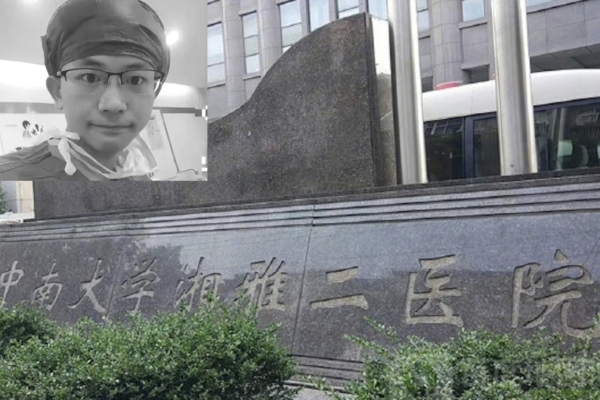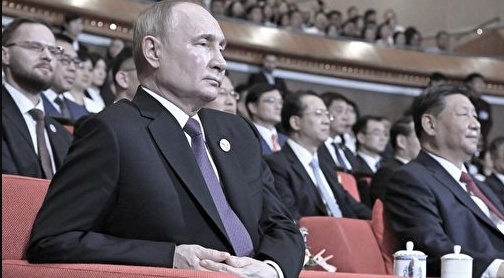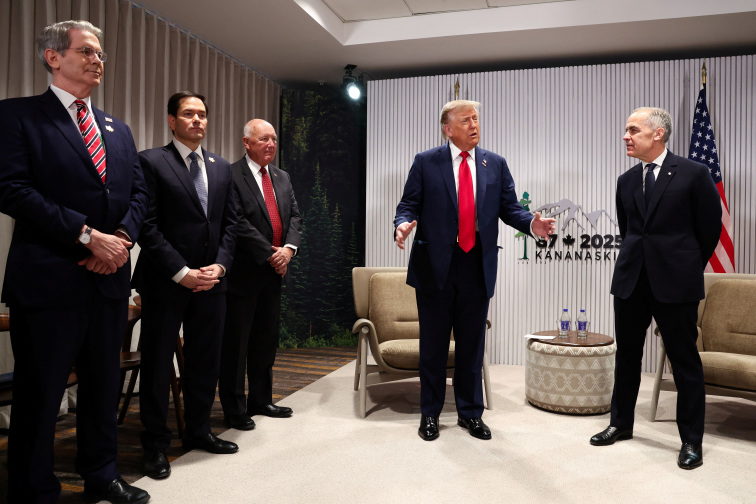Luo Shuaiyu’s sudden death last year and the evidence he left behind may suggest that he was a whistleblower. His tragic fate likely points to a much larger systemic web of vested interests. (Weibo image/composite image)
[People News] Luo Shuaiyu’s case has suddenly resurfaced online, even trending on major platforms. Yet the incident actually occurred last year. Meanwhile, Gao Yichen, former Deputy Director of the notorious "610 Office," has now come under official investigation. What’s the connection between these two events?
According to analysis by Heng He, a special commentator for The Epoch Times, Luo Shuaiyu was a graduate medical student and intern in the Kidney Transplant Department at Xiangya Second Hospital of Central South University. On May 8, 2023, he fell to his death from a dormitory building at the hospital. Police initially ruled it a suicide, but his parents found signs of a struggle in the dorm and suspected murder.
Before his death, Luo had gathered a large amount of evidence accusing the hospital of illegal organ harvesting and trafficking, implicating Vice President Liu Xiangfeng and the transplant department chief in medical corruption.
A key turning point was Luo’s refusal to help locate 12 children, aged 3 to 9, to be used as organ donors—an incident that ignited his conflict with the hospital.
After Luo’s death, his parents recovered data from his phone and computer, uncovering over 1,000 pieces of evidence—including audio recordings and screenshots—indicating internal organ trafficking at the hospital.
On October 19, 2023, they livestreamed these revelations on Douyin (Chinese TikTok), but their account was wiped on November 2. The hospital quickly scapegoated Liu Xiangfeng, who was sentenced to 17 years in prison for intentional injury, bribery, and embezzlement—charges unrelated to organ transplantation.
Luo's Parents Launch “Refuse Silence” Memorial Campaign
Recently, Luo’s case again became a hot topic in China. The trigger was the one-year anniversary of his death on May 8, when his parents launched a memorial campaign and open letter calling for justice under the banner “Refuse Silence.” They also released new photos of the dorm showing signs of struggle, reigniting public discussion.
What's peculiar is that although their Douyin account had been cleared last year, this time their renewed efforts weren’t immediately censored. Nor were public discussions about the case, especially rare given the sensitive topic of live organ harvesting.
Public outcry intensified until June 13, when the Hunan Health Commission, Central South University, and Changsha police issued a joint investigation report, maintaining that Luo died by suicide and denying all allegations of organ harvesting.
The report claimed all 50 kidney donation records Luo collected were legitimate, and that his devices weren’t wiped of data nor contained any reports implicating Liu Xiangfeng or the transplant department.
Authorities suggested Luo’s suicide stemmed from academic pressure: he had failed the national medical exam in 2022, hadn’t completed his thesis, and hadn’t secured a job. They admitted that he had received a ¥333,000 “performance bonus” that the transplant department later rescinded, hinting at financial pressure but denying any link to his death.
Following this official statement, posts on X claimed that Luo’s parents were still speaking out online as of June 13—but by June 14, they had been placed under “soft detention.”
Luo Was Told to Find Child Donors — Parents Question Legitimacy of Organ Allocation System
What truly reignited public concern wasn’t Liu Xiangfeng’s medical corruption—he’s already been sentenced—but the issue of organs.
Two major revelations raise systemic alarms: Luo was instructed to find young children to serve as organ donors, suggesting serious flaws in the CCP’s so-called “Organ Donation and Allocation System.” One donor, an 11-year-old girl named Wu Hongyi, had a father surnamed Wu, but her mother’s info was missing.
A reverse lookup of the family’s phone number showed a completely different name—Xie Gengxiang—indicating the system data might have been fabricated.
In their open letter, Luo’s parents publicly questioned the legitimacy of China’s “China Organ Transplant Response System” (COTRS), stating that major irregularities emerged during verification.
Even official media joined the discussion.
Xinhua News Network (Jiangsu Province’s party-run media outlet) raised six critical doubts: suspicious death location, strange dorm scene, large cash on hand, odd text messages, missing computer data, and abnormal fund transfers. But they pointedly avoided the most important issue: the source of the transplant organs.
China’s Organ Allocation System Is a Global PR Hoax
The Luo case exposes a key reality: China’s organ allocation system (COTRS) is a public relations hoax. Though COTRS was developed in 2011, it remained obscure until 2015, when China announced it would stop using executed prisoners as donors and switch fully to voluntary civilian donations, making COTRS the only legal allocation platform.
Top transplant doctors expected organ transplants to decline after halting prisoner use, but they instead increased. According to transplant czar Huang Jiefu, the State Council founded a national organ donation command centre, supposedly coordinating all donations. Yet as late as 2016, this centre was still under construction, raising questions about how the system could have functioned at all.
In reality, COTRS primarily serves as a cover story for explaining the untraceable sources of transplant organs. It also gives international medical authorities who defend the CCP a pretext to deny organ harvesting abuses.
At the 2016 U.S. Congressional hearing on organ harvesting, former president of The Transplantation Society, Dr. Delmonico, claimed that the Chinese Communist Party (CCP) had abandoned the use of organs from executed prisoners and had switched to using voluntarily donated organs. Delmonico was very adept at helping the CCP defend itself. From the very beginning, this issue was never really about organs from death row inmates — the CCP has been deliberately hyping the narrative around death row organ use to cover up the crime of harvesting organs from Falun Gong practitioners.
Delmonico said that he had gone to China to conduct an on-site inspection of the COTRS (China Organ Transplant Response System). When a U.S. congressman pressed him on who had funded his trip, he replied that it was the Huang Jiefu Foundation. However, China has never had a foundation named after an official still in office, and as Huang Jiefu was then Vice Minister of Health, this case was no exception.
In fact, there is only one foundation in China related to organ transplantation: the China Organ Transplant Development Foundation. In 2015, it received 20 million yuan from the national treasury, making it a state-run, not a private, foundation. Although the fund was ostensibly used to operate the organ allocation and sharing system, it was clearly also used for international public relations.
Given that Luo Shuaiyu was asked to locate 12 children aged 3 to 9 to serve as organ donors, it is evident that these donors or their organs were not within the COTRS system. In other words, nearly ten years after the Chinese Communist Party (CCP) claimed that all transplant organs were allocated exclusively through COTRS, a large number of organs still originated from outside the system.
This may also help explain the fate of many missing persons in China, including children like Hu Xinyu.
610 Official Gao Yichen Investigated — Likely Related to Factional Infighting
Allowing discussion of live organ harvesting to go viral online is not a decision made by a hospital or local authorities in Hunan. This requires authorisation from central-level departments. The fact that the Luo case has trended for nearly a week suggests that a power struggle may be taking place at the top.
This likely relates to another recent development: the June 2025 announcement that former Deputy Director of the Central 610 Office, Gao Yichen, is under investigation, eight years after his retirement.
The Central Commission for Discipline Inspection posted a one-sentence announcement: “Gao Yichen, former deputy director of the Office of the Central Leading Group for Preventing and Handling Cults, is suspected of serious violations of discipline and law and is currently under investigation.”
This refers to the Central 610 Office, established on June 10, 1999, as the main command centre for persecuting Falun Gong. It’s one of the most politically cursed positions in the CCP system.
The first public disclosure of the office came in 2013, when then-Director Li Dongsheng was investigated by the CCDI. Since then, several 610 officials have fallen, including Fu Zhenghua, Zhang Yue, Sun Lijun, and Peng Bo.
Gao Yichen became Executive Deputy Director of the 610 Office in 2005 and likely retired by 2017. He was formerly a Vice Minister of State Security—overseeing foreign intelligence—and was transferred to 610 specifically to enhance its overseas operations and suppression efforts. Overseas intelligence was primarily aimed at suppressing Falun Gong abroad.
Li Dongsheng's Fall Helped Take Down Zhou Yongkang — Who Is Gao Yichen Targeting?
Why now? One reason may be that starting around 2005, overseas Falun Gong practitioners launched dozens of lawsuits against senior CCP and central-level officials. Another may be the 2008 Beijing Olympics, which required massive intelligence gathering on overseas dissidents and potential protesters.
This aligns with French journalist Roger Faligot’s analysis in The Chinese Secret Service: From Mao to the Olympic Games. By the time of the Olympics, the 610 Office had already become a vast global intelligence network.
Gao has been retired for eight years, and “serious violations” almost always refer to actions taken while in office. Why resurrect his case now? Although the CCDI’s notice is brief, Jiemian News’ headline emphasised that he “worked overseas for many years”—implying that the investigation likely relates to his foreign intelligence activities.
Gao’s official titles before retirement included: Deputy Director of the Central 610 Office. Deputy Secretary-General of the Central Political and Legal Affairs Commission. Deputy Director of the Central Stability Maintenance Office. Yet the CCDI announcement only listed his 610 role, suggesting his violations are tied to overseas intelligence and transnational repression conducted under that office.
Eleven years ago, the downfall of 610 Director Li Dongsheng helped expose the top boss of that system: Zhou Yongkang. Now, the investigation of Gao Yichen may similarly point toward another high-level target.
Gao's intelligence work at 610 was focused on Falun Gong. Although the CCP’s persecution policy hasn’t changed, most past 610 directors have now been purged amid internal power struggles.
In recent years, Xi Jinping has personally directed transnational suppression campaigns targeting Shen Yun Performing Arts and Falun Gong–affiliated media. Gao Yichen’s fall may serve as a warning to those now executing those policies. △









News magazine bootstrap themes!
I like this themes, fast loading and look profesional
Thank you Carlos!
You're welcome!
Please support me with give positive rating!
Yes Sure!